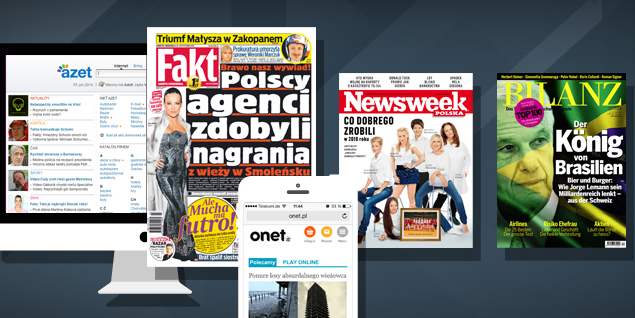‘The tide is turning for digital journalism’ – A conversation with FIPP board member Jan Bayer

As board member, Jan Bayer oversaw some of Axel Springer’s major successes in digital media. INSIDER, Axel Springer’s US acquisition, grew by 45 per cent in revenue last year and serves 400 million active users. Upday, a news aggregator built in collaboration with Samsung, became one of the most frequently visited news sites in Germany within three years of launch in 2015. But Jan Bayer wants to push Axel Springer even further into the digital age.
“The tide is turning for digital journalism, but we need to be prepared to push further by delivering the best possible journalistic products,” says Jan Bayer. “If we look at distribution, we are reaching ‘peak media’ in the developed world: the share of mobile is still rising, but almost everyone is online. There is fierce competition for a finite number of online hours in a reader’s day. This means that user experience must become increasingly sophisticated, while journalistic standards remain as high as ever.”
Key trends in publishing are similar across all markets Axel Springer operates in, Bayer observes: Print circulations and ad revenues are under pressure, digital models are growing, new technologies such as artificial intelligence are on the rise.
“I strongly believe in digital subscription models. If done right, they work. The impressive success story of the New York Times is a case in point. However, overall, publishers still have a long way to go. AI-based personalisation, for example, is fledgling in media offerings. Also, programmatic targeting will become much more sophisticated in the future.”
|
Dr. Andreas Wiele, president Classifieds and Marketing Media and member of the executive board of Axel Springer, will be at the Digital Innovators’ Summit, 18-20 March in Berlin, unpacking ‘High-speed disruption, real data, the scourge of fake news.’ Book your tickets for DIS2018 by 13 March to avoid late registration fees. Read our Q&A with Dr. Andreas Wiele on how to win as a digital publisher.
|
Strategic implications for publishers
Bayer says there are three key priorities publishers should focus on: the customer, technology and a culture of change.
“Historically, the publishing industry did not have to focus on the reader as much, when only a few national newspapers were available in each market and customers had no alternatives. Now, journalism is a buyers’ market. Music and entertainment went through a similar transition: Companies like Spotify and Netflix understood what readers want and created business models in segments that were under pressure through digitisation.”
Bayer believes that similar product excellence is possible in journalism. “When you ask young people why they do not buy our digital subscriptions, the answer tends to be something like ‘Google News is more efficient because I can read about what I am interested in’. Why can’t publishers be as efficient, and counter filter bubbles in social media with high-quality personalisation of relevant news? The only way we can get there is by leveraging data and technology. Upday, for instance, which we developed for Samsung, is based on a smart combination of algorithms and journalistic curation.”

The imperative to invest in technology also pertains to advertising. Given current concerns about brand safety on platforms, Bayer believes that brand advertising will remain a strong source of revenue for publishers. He references the recent threat by Unilever to remove budgets from platforms. “No consumer brand will find its logo under an ISIS video on a trusted news site. As an industry, we must get better at articulating this. But: We can only capitalise on our brand safety advantage vis-à-vis platforms if we, too, have superior algorithms bringing the right ad to the right screen at the right time”, stresses Bayer.
Lastly, none of this will work without a culture of speed and innovation, he continues. “Technology and data are to digital publishing what paper is to print – table stakes. But most publishers do not think that way yet. Excellent journalism will always remain excellent journalism at the core, but in order to become excellent at all distribution channels including digital, we must become faster, more agile and more product focused than we have been in the past.”
Axel Springer recently appointed a board member specifically for technology and data to make sure the company makes the most of digitisation. “In my time at Axel Springer, I witnessed an amazing cultural transformation. We have truly ‘trained our change muscle’, as our CEO Mathias Döpfner likes to put it. Change excites us.”
Lastly, Bayer reminds publishers not to neglect print in the midst of digital transformation. “Print is still a big, profitable business for most of us, and it will stay relevant for a long time if we have the right strategies and dedicated teams in place to manage it.”
Read: Dr. Jens Müffelmann to leave Axel Springer
Reorganising for success?
Bayer has been a proponent of managing digital and print separately in order to allow each to transform – and grow stronger – on their own.
“We have created two new publishing units in Germany: Axel Springer Print News Media and Axel Springer Digital News Media. Previously, our publishing organisation was organised by brands. But the business challenges for digital and print media are completely different, and this is true for all brands. That is why we have bundled our digital media business in Germany as well as our print media business in two separate, dedicated units. Our newsrooms remain untouched by this change. We did this because technology is scale-driven at the core: One state-of-the-art product platform will create more value than multiple small ones. The new structure will also help us attract top tech talent.”
Bundling capabilities is what Bayer sees as FIPP’s role as an industry platform. It allows members to exchange best practices and learn from each other across geographies, he says. “FIPP is an excellent forum for key individuals in our industry to formulate common positions. We will all benefit from higher product standards in digital journalism.”

More about Jan Bayer and Axel Springer
Jan Bayer is President of the News Media division at Axel Springer. He has been a member of the executive board since 2012. Mr. Bayer was born in 1970 and holds a Master’s degree in media studies. Prior to his board membership, he served as chairman of the executive board of Welt Group and as publisher at Süddeutsche Zeitung in Munich.
With Bild and Welt in Germany, Insider in the United States, Politico in Brussels and a range of other brands, Axel Springer owns a EUR €1.5 billion revenue portfolio of national newspapers, special interest magazines and news websites in 15 countries.
More like this
Jeff Bezos receives the Axel Springer Award 2018
Axel Springer is granted clearance to acquire Logic-Immo
Axel Springer invests in mixed reality company Magic Leap
Axel Springer supervisory board appoints Dr. Stephanie Caspar as president technology and data
Axel Springer’s Dr. Andreas Wiele on how to win as a digital publisher










